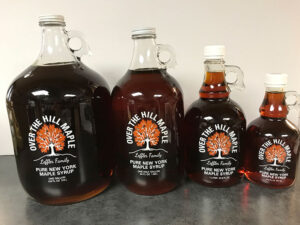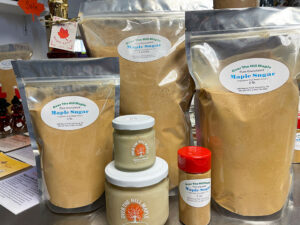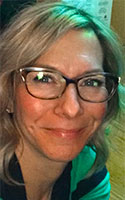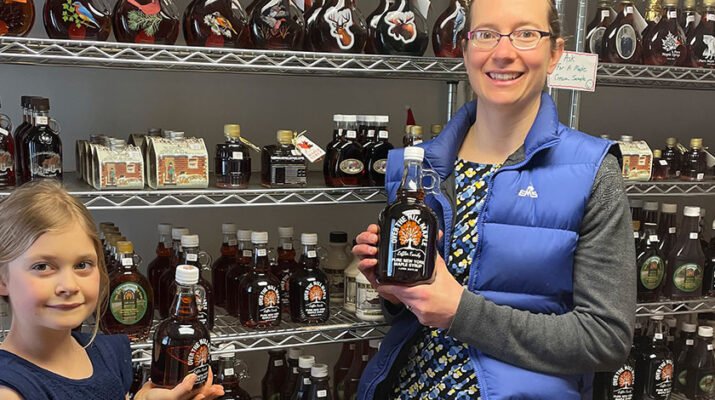Diversions help them relax after dealing with the pressures of nursing
By Deborah Jeanne Sergeant
 Nurses provide healthcare, reassurance and health education to patients. Beyond their caring, professional demeanor, they may have hobbies and interests that patients and colleagues would not envision.
Nurses provide healthcare, reassurance and health education to patients. Beyond their caring, professional demeanor, they may have hobbies and interests that patients and colleagues would not envision.
The patients of two Western New York nurses would likely never guess that their caregivers enjoy sweet hobbies.
Jennifer Leffler, a nurse in the emergency department for Rochester Regional United Memorial Medical Center in Batavia, makes 1,400 gallons of maple syrup a year from her Varysburg farm, Over the Hill Maple.
Leffler learned the craft of sugar making from her father, Mark Flint of Castile. Although her family used old-fashioned buckets on spiles embedded into maple trees, Leffler and her husband, Zebulun, use modern equipment like a vacuum system and plastic tubing to ferry sap from their 4,400 taps to their sugar house. That is where the couple houses a 6,000-gallon tank where UV lights reduce the bacteria.
A reverse osmosis system helps evaporate the sap more quickly and then the liquid goes to the evaporator to achieve the right consistency and sweetness. It takes about 40 gallons of sap to make one gallon of maple syrup.
A seasonal product, maple producers tap trees from the end of fall through the early part of winter and the sap starts flowing around January or February as early thaws begin. Sap flows only during times of freezing nights and warmer days. Sap collecting lasts about six weeks.
The Lefflers bottle syrup and create a few value-added products, including maple cream and granulated maple sugar in their farm’s commercial kitchen and sell from the farm and at stores. The couple’s children “like helping out,” Jennifer Leffler said. Zebulun’s parents, Ron and Kim Leffler, assist as well.
Jennifer Leffler sometimes talks about her maple farm with patients.
 “Usually, talking about nonmedical things can cheer them up and it helps them feel better instead of focusing on their illness,” she said. “It’s an encouragement.”
“Usually, talking about nonmedical things can cheer them up and it helps them feel better instead of focusing on their illness,” she said. “It’s an encouragement.”
She has quite a few farmers come into her care, and they are particularly interested in Over the Hill Maple and the couple’s other agricultural business, making hay for livestock.
“Choose joy in doing what you do,” Leffler said. “Maple is hard and baling is hard, but we really enjoy what God has given us. We enjoy it.”
Honey production
Erin Hafner, a nurse working in labor and delivery at Mercy Hospital of Buffalo, harvests 8 to 12 pounds of honey from her home-based hives each year.
Though at work she helps babies, her hobby is helping bees. For the past five years, she has kept one to two hives at her home.
She became interested in beekeeping through an introduction to beekeeping class at Masterson’s Garden Center in East Aurora. Her beekeeping complements her enjoyment of gardening and flowers on her one-acre property. To keep her little honey-makers in good health, she eschews herbicides and provides plenty of wildflowers for their nectar gathering. Since bees will forage as far as five miles away, Hafner’s location near three garden centers provides additional opportunities for the bees.
“Some people think I’m crazy for keeping bees,” she said. “I think they’re beautifully fantastic little creatures. I’m in love with them.”
With an apology to her bees, Hafner gathers just a small amount of what they produce, as bees use the honey they have stored in the comb as their food. She gives away some to friends and keeps some for her family.
“The honey is a nice perk,” she said. “I do it more for what they teach me.”
She views caring for her hives every two weeks from May through September like a 20- to 30-minute meditation where she remains fully in the moment with all her senses engaged: hearing buzz, watching and feeling their movement, smelling the sweet hive aroma and finally, tasting honey.
She named her current queen Athena.
The other 30,000 to 40,000 bees by necessity must remain nameless.
“A queen’s body is completely different from the other bees,” she said.

Hafner said that as a matriarchal society, bees have only about 500 males per hive. All the bees seen foraging on flowers are females. The male drones live in the hive and die after mating with the queen.
“If there are any males at the end of the summer, they kick them out,” Hafner said.
Inside the hive, each bee performs a job based on the age of the bee: cleaner, nursery worker or attendant to the queen whose only job is egg laying.
She said that like other nurses, she is a nurturer by nature.
“To invest this time and energy into something for me, it helps me from getting burned out,” Hafner said. “This is my ‘me’ time. I’m also helping out the environment.”
Photo: Nurse Jennifer Leffler works in Batavia. When she isn’t working, she can be found at her Varysburg farm, where she and her family produce 1,400 gallons of maple syrup a year, and other products, sold under the label Over the Hill Maple.

